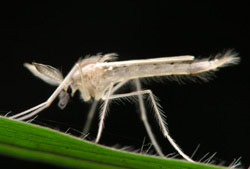To a Mosquito, You Are the Stinkiest Species

Get the world’s most fascinating discoveries delivered straight to your inbox.
You are now subscribed
Your newsletter sign-up was successful
Want to add more newsletters?

Delivered Daily
Daily Newsletter
Sign up for the latest discoveries, groundbreaking research and fascinating breakthroughs that impact you and the wider world direct to your inbox.

Once a week
Life's Little Mysteries
Feed your curiosity with an exclusive mystery every week, solved with science and delivered direct to your inbox before it's seen anywhere else.

Once a week
How It Works
Sign up to our free science & technology newsletter for your weekly fix of fascinating articles, quick quizzes, amazing images, and more

Delivered daily
Space.com Newsletter
Breaking space news, the latest updates on rocket launches, skywatching events and more!

Once a month
Watch This Space
Sign up to our monthly entertainment newsletter to keep up with all our coverage of the latest sci-fi and space movies, tv shows, games and books.

Once a week
Night Sky This Week
Discover this week's must-see night sky events, moon phases, and stunning astrophotos. Sign up for our skywatching newsletter and explore the universe with us!
Join the club
Get full access to premium articles, exclusive features and a growing list of member rewards.
You may think you give off less odor than your dog, but to some species of mosquito, you're the smelliest game in town.
It's long been known that some mosquitoes are tiny human-seeking missiles, homing in on the odor of our sweat. The species that transmits malaria(Anopheles gambiae), and the species that spreads dengue and yellow fever (Aedes aegypti), are particularly people-centric. According to a new editorial published in the journal Trends in Parasitology, this may be because humans give off unique scents not seen elsewhere in the animal kingdom. [Infographic: Where and Why You Stink]
"The unique composition of human sweat appears to explain its tantalizing effect on anthropophilic mosquitos," wrote researchers Renate Smallegange, Niels Verhulst and Willem Takken, who study mosquito-host interactions at Wageningen University in The Netherlands. ("Anthropophilic" means "human-loving," though few victims of the mosquitoes' bites appreciate the affection.)
Why you smell
Humans have three different types of skin glands. Sebaceous glands, found all over the body but especially on the face and head, produce oils to protect the skin and hair. Eccrine glands, found all over the body, produce sweat to regulate temperature, but this sweat is mostly water with trace amounts of salt and other compounds. Finally, there are the stinkiest glands of all: the apocrine glands, found in the armpit and genital areas.
Eccrine glands are the most abundant sweat glands on the human body, setting people apart from most other mammals. Dogs, for example, pant to regulate their body temperature, because their eccrine glands are limited mostly to the bottoms of their paws. Chimpanzees and gorillas have a mix of roughly 60 percent eccrine glands and 40 percent apocrine glands, the Wageningen researchers report. Monkeys, gibbons and orangutans have about a 50-50 ratio. Our abundance of eccrine glands and relative lack of apocrine glands makes humans, in a word, weird.
The composition of our secretions also sets people apart, the researchers report. Human skin oils are full of molecules called carboxylic acids. Other mammals lack these compounds, which could be what makes humans smell like an A. gambiae all-you-can-eat buffet.
Get the world’s most fascinating discoveries delivered straight to your inbox.
"If you're in a room full of cows, this mosquito will find and bit you. It will never bite the other animals," said Laurence Zwiebel, a mosquito olfaction researcher at Vanderbilt University who, like the Wageningen researchers, is funded in part by the Bill and Melinda Gates Foundation.
Other mosquito species specialize in lizards, birds and non-human animals, but the predilection for human blood is what makes A. gambiae and A. aegypti so dangerous – and so interesting to scientists, Zwiebel told LiveScience. Understanding the chemical attractants humans create can help researchers develop mosquito traps and repellants, stopping infectious disease in its tracks. Even magnifying the smell of attractant chemicals can disgust mosquitoes, Zwiebel said: "It's like being on an elevator with someone with too much perfume."
Bacterial breakdown
One of the most important details in the new article, Zwiebel said, is the connection between the way we smell and the bacteria that live on our skin. Bacteria are responsible for breaking down the molecules in sweat and making it stink; every person has an individual bacterial "fingerprint," a unique population of bacteria that call our bodies home. These individual differences could explain why mosquitoes swarm one person while leaving the person standing next to them in peace, the researchers wrote. (Although sometimes, Zwiebel said, a mosquito-plagued person may just be more allergic to the bites and thus notice mosquitoes more.)
Little is known about the difference between human microbial skin colonies and the micro-organisms that live on animal skin, the researchers wrote. Understanding how skin microbes match up with mosquito meal preferences could help researchers to pinpoint important chemical components of sweat scents, they wrote.
Kids tend to be bitten less by malaria-carrying mosquitoes, the researchers wrote, perhaps because their sweat is less pungent to A. gambiae. Malaria-carrying mosquitoes bite men and women equally, but the yellow and dengue-fever-carrying variety likes men more.
"There are so many species, so many chemicals, it's a big jigsaw puzzle, basically," said James Logan, a lecturer in medical entomology at the London School of Hygiene and Tropical Medicine. When it comes to understanding the compounds involved, Logan told LiveScience, "we're not even halfway there."
Which isn't to say there's no progress. Logan and his team have discovered that some people seem to excrete natural mosquito repellents. They're now working to produce and sell a mosquito repellant based on that research. The Zweibel and Takken labs have created a blend of carboxyl acids that drive mosquitoes wild. That blend is now used in mosquito traps in Africa, Zweibel said.
In their editorial, Takken and colleagues call for research into the bacterial colonies living on different species. Meanwhile, Logan and his team are now working to understand the genetic variation in human excretions. It's also important to understand what role bacteria play versus what scents humans create on their own, Logan said.
"At the moment, we don't really have a trap that is as attractive as a human being," Logan said. "If we can replicate a human being by using the chemicals that are attractive to mosquitoes, then we'd have an extremely effective trap."
You can follow LiveScience Senior Writer Stephanie Pappas on Twitter @sipappas.

Stephanie Pappas is a contributing writer for Live Science, covering topics ranging from geoscience to archaeology to the human brain and behavior. She was previously a senior writer for Live Science but is now a freelancer based in Denver, Colorado, and regularly contributes to Scientific American and The Monitor, the monthly magazine of the American Psychological Association. Stephanie received a bachelor's degree in psychology from the University of South Carolina and a graduate certificate in science communication from the University of California, Santa Cruz.
 Live Science Plus
Live Science Plus










